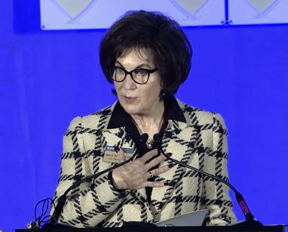Delegates pass policies on rabies vaccinations and collecting antimicrobial use data
Dr. Janet Donlin

VIN News Service screenshot
Dr. Janet Donlin, CEO of the AVMA, opened the House of Delegates meeting on Friday by acknowledging the impact of the pandemic on veterinary medicine. "The past 24 months have been extremely challenging, both professionally and personally," she said.
At 99,500 members and counting, the American Veterinary Medical Association is poised to hit a milestone.
"You guys, you know it's going to be over 100,000 next year," AVMA CEO Dr. Janet Donlin announced to the House of Delegates, which convened on Friday in Chicago for the policymaking group's winter session. The two-day meeting is held annually as part of the AVMA Veterinary Leadership Conference.
The House, comprised of delegates from each state, two territories and 18 allied groups, considered opening the AVMA's membership to non-veterinarian practice staff to foster inclusivity, and debated ways to make licenses more portable from state to state, particularly in response to natural disasters and emergencies. They also passed a resolution regarding the use of antimicrobials, revised a policy on rabies vaccination waivers and directed the AVMA Board of Directors to consider definitions for a variety of practice entities, including hospitals and clinics.
Many delegates took advantage of the AVMA's virtual platform. Of 129 delegates in attendance, 64 participated in person and 65 participated remotely. The AVMA offered a travel-free option for the meeting in response to the spread of the omicron variant of SARS-CoV-2, which causes COVID-19.
Donlin kicked off the event, taking the podium to talk about challenges the profession has faced during the pandemic.
"Veterinarians are working harder than ever before," she said. "They're having more trouble retaining staff, hiring staff, and the clients are a little bit crabby. … All of this, including having to navigate supply chain obstacles and trying very hard to keep everyone safe wherever you work from COVID. It hasn't been easy. We understand that."
Expanding AVMA membership
The topic of expanding AVMA membership to include veterinary technicians, hospital managers and other practice staff generated robust discussion. The AVMA already has an affiliate membership category for non-veterinarians who teach veterinary-related sciences or engage in veterinary research. Currently, there are 26 members in this group.
Efforts to open AVMA membership further did not come to fruition. Rather, delegates asked the Board of Directors to reach out to groups such as the National Association of Veterinary Technicians in America and the Veterinary Hospital Managers Association about working together collaboratively to strengthen their ties.
Letters

Dr. Libby Todd, a delegate from Alabama who introduced the topic to the House, shared that the Alabama Veterinary Medical Association is considering whether to invite non-veterinarians to become members, much like other groups. Many associations, she said, extend membership rights and/or research access to professional staff, she said.
Among them is the Georgia Veterinary Medical Association, which offers a "premier-level membership that extends to all support staff," she said. So does the American Bar Association, which offers membership at a reduced cost for "affiliate professionals," a category that includes paralegals and economists. The American Optometric Association does something similar, she said.
The AVMA, Todd said, "works on behalf of the entire profession."
"The idea is not to undermine great partners … or to employ a tactic with the goal of increasing membership or dues revenue," she said, but to discuss "opportunities to potentially be more inclusive and to consider how these opportunities could advance the profession and the veterinary health care team."
While her opinions were echoed by some delegates, many expressed opposition.
Dr. Gary Stuer, delegate for the American Holistic Veterinary Medical Association, said that expanding AVMA membership would send "the wrong message" at a time when the national organization is promoting benefits tailored to veterinarians.
"I think state associations, allied organizations — it is completely appropriate for them to include non-veterinarians," he said. "But I'm just not sure that it's a good idea for the AVMA."
Utah delegate Dr. Paul Toniolli reflected the sentiments of veterinarians in his state. "We're at about a 60/40 split, 60% not liking it …" he told the House.
Concern expressed by one constituent brought to mind the "camel in the tent" analogy, Toniolli said: "Little by little the camel gets in the tent, and the master of the camel gets shoved out of the tent.
"Now, I don't know that our association would be overtaken, but the principle that the camel in the tent teaches is that sometimes small, seemingly harmless acts, even made with good intentions, can sometimes have very negative repercussions, and that would be our concern," he said. "Somebody with alternative ideals might try to get in and strong-arm the association."
Toniolli added that another Utah veterinarian opined that offering AVMA membership to non-veterinarians would undermine the privilege she earned from 12 years of education.
Dr. Wendy Hauser, delegate from the American Animal Hospital Association, offered that AAHA membership is open to non-veterinarians because the group's accreditation process requires "the whole team to really drive those initiatives."
She said, "It really does create great inclusivity."
For a similar reason, the American Association of Bovine Practitioners recently amended its bylaws to include veterinary technicians, according to Dr. Fred Gingrich, executive vice president. "We were asked by veterinary technicians to be able to join; they wanted access to our online [continuing education] resources," he said.
However, Gingrich told the House: "I do think there's a difference between state associations [and] allied associations in how they enhance their membership. I do think that it's reasonable for the AVMA to investigate a need. But I would also caution utilizing AVMA resources, which are precious and … are certainly limited, in pursuing an endeavor where there's no need."
Expanding the AVMA's membership also could have a financial implication for practices.
"One of the initiatives that AVMA has pursued is encouraging practice owners to provide membership to all of their associate veterinarians, and we certainly support that," Gingrich said. "But if we're now asking that practice to pay for membership for 10, 15, 20, 30 staff, I think that there is a financial involvement there for practice owners."
License portability explored
The House also asked the Board of Directors to explore whether the AVMA can help make it easier for veterinarians licensed in one state to gain licensure in another. Per its request, the board is expected to collaborate with state and allied organizations "to further understand what issues need to be resolved and how to address them."
The AVMA is not a regulatory body but carries influence, addressing such topics in the association's model practice act.
License portability impacts practitioners who want to move to another state, those who live and work near state borders, and veterinarians who want to provide aid during disasters occurring in a state where they are unlicensed.
Many practitioners are regularly hamstrung by the limitations of state licenses and "new concerns have emerged in the face of the pandemic, particularly the shortage of veterinarians," said Dr. Juan Pablo Amieiro-Puig, delegate for Puerto Rico.
Some in the profession have proposed deferring only to a national license that could ease such restrictions. But that's "highly unlikely" because it would require state governments to forfeit control over licensing, and some already provide a pathway for temporary licenses in emergency situations, Amieiro-Puig said.
He suggested a potential solution adopted by human medicine: Interstate licensure compacts, which provide voluntary, expedited pathways to licensure for qualified physicians and nurses. The Interstate Medical Licensure Compact, for example, has been adopted by 17 states. Participants in the compact agree to share information and work together to streamline licensing processes to make it easier to expand access to health care, particularly for those in rural or underserved areas, and to facilitate the use of telemedicine.
"These are not blanket permits …" Amieiro-Puig said, and problems still arise "when professionals trying to respond to a disaster do so outside of the state request for assistance.
"Some states do provide mechanisms [to do that], but there are usually fees and limitations involved," he continued. "… God willing, we'll be able to come up with something to service our profession."
Dr. Amanda Bisol, delegate from Maine, identified with a group impacted by the process of license portability: veterinarians doing relief work.
"You apply, and it might take a lot of effort … and then it could take a month to get your license," she said. "It would be nice if they could get a temporary license quickly, and they could get fully approved quickly."
Issues surrounding license portability also burden new graduates, said Hidayah Martinez-Jaka, a fourth-year student at the Virginia-Maryland College of Veterinary Medicine and president of the Student American Veterinary Medical Association.
It starts with the application system for the North American Veterinary Licensing Examination, the national examination required of all U.S. practitioners. To verify a student's eligiblity to take the exam, the state where they plan to work must issue its approval. That requires students to declare where they'll be practicing, almost a year before graduation. "A lot can happen in that time," Martinez-Jaka said.
If a NAVLE candidate takes a job in a state that's different from the one declared, there's a fee to make the switch. "As a new grad, you're already in so much debt," Martinez-Jaka said. "... On top of that, there are these obstacles to shifting your license from one state to another."
Dr. Margo Macpherson, alternate delegate for the American Association of Equine Practitioners, spoke on behalf of the House's allied caucus, which she said "discussed this at length" and isn't in favor of a national license.
The consensus, she said, is that the problem with maintaining multiple licenses is an issue of efficiency, not expense. She expressed hope that the AVMA might be effective in helping to improve that.
"Many more people are now working in locums — I myself do — or as relief veterinarians," she said. "That's the future generation this profession."
Policies on antimicrobials, rabies
In swift order, delegates unanimously passed four resolutions to update policies or enact new ones, including a policy that professes the AVMA's support for collecting antimicrobial use data to help combat drug resistance.
The policy, developed by the AVMA Committee on Antimicrobials, "describes best practices for collecting this [antimicrobial use] data, what should be considered during its analysis, and how the data might be used to inform and advance veterinary clinical decision making."
The House also revised the AVMA's policy on rabies vaccination waivers. The changes, recommended by the AVMA Council on Public Health, emphasize that the zoonotic disease is almost always fatal and vaccinating animals is a primary method to prevent infection and protect public health.
The revisions clean up redundant language in the policy, which supports communicating to clients that unvaccinated animals are at risk for infection, and euthanasia might be required if exposure occurs.
The U.S. Centers for Disease Control and Prevention reported this month that five people died last year in the country after contracting rabies, the most fatalities in a decade. The disease is transmitted primarily through virus-laden saliva from the bite of an infected mammal, often a bat.
The House passed a recommendation from the AVMA Food Safety Advisory Committee to restructure the association's existing policies on food safety and the drugs used by exporting countries that are banned in the U.S.
Now both policies are summarized in a single policy "to improve clarity." The new version emphasizes the role of veterinarians in food safety and streamlines language that identifies effective food safety programs, including the need for coordination between regulatory agencies and the food production workforce, as well as ongoing investment in new technologies and research.
Delegates also voted to refer a resolution to update how the AVMA classifies veterinary facilities to the Board of Directors for additional consideration, after raising concerns and questions about proposed definitions for terms such as clinic, hospital and center.